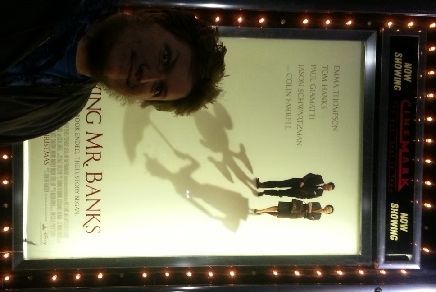Movie Review: ‘Saving Mr. Banks’

Nick Hamden nick.hamden@iowastatedaily.net
“Saving Mr. Banks” achieved a 3/5 by Iowa State Daily movie reviewer Nick Hamden.
December 24, 2013
Before this week, I had never seen “Mary Poppins.” Classic movie sure, and I of course knew songs and scenes from it, but I never watched it in its entirety. Blame the parents. While watching the movie as an adult, I did find it very odd. The message was clear: money is evil, family is great, but why they chose to enforce that message in the 1960s was beyond me.
That was my main goal for watching “Saving Mr. Banks” (Trailer): to figure out what the money and banks ever did to the Mary Poppins author. Oh, and to figure out why she was behaving like a huge meaniehead.
“Saving Mr. Banks” is supposed to tell the true-ish story of Walt Disney (Tom Hanks) acquiring the rights to a film version of “Mary Poppins,” from the author P.L. Travers (Emma Thompson). Of course because it is a Disney movie about the creator of Disney, don’t expect that much actual truth in the movie.
The one thing that does appear to be truthful is that Travers was very very hard to work with. She was granted script rights, and she used the heck out of them. She did not want animation, music or Dick Van Dyke. She did not want a lot of things. She was very peculiar over her character, and did not want Disney to mess it up.
Everything else that occurred in the film is whatever they wanted to say, presumably to rewrite history. For instance, Disney was a chronic smoker and he never hated it, despite it leading to his death. They made a few tiny references in the movie (a cough every once in awhile) but made sure they never showed him doing the deed. In fact, he had a line calling it a disgusting habit and one he was trying to quit.
The movie is spliced with the tale of Travers’ early life, when she moved to the middle of no where with her family. She lived in a small house, but had a loving (yet alcoholic) father (Colin Farrell), and a quite annoyed mother (Ruth Wilson). Her stories were based on an actual nanny sent to clean up their home, after a few unfortunate events leaving it in disarray.
It should be obvious that most of her complaints with the original script, end up getting included in the final project. So something has to change by the end of the movie, but is it change that all parties actually agree on?
Also featuring Paul Giamatti as an optimistic driver (strange role for him), Bradley Whitford as the writer, and B.J. Novak and Jason Schwartzman as the song writers.
After watching the movie, I am unsure how much of it is true, and how much of it is just revisionist history. I mentioned a few discrepancies above, but I also don’t know if the back story on Travers’ early life is accurate. I loved the back story, loved it far more than the other part of the film. It was sweet and it was tragic. It made “Mary Poppins” make a heck of a lot more sense and give it a more powerful meaning. But given all the other changes, I can only doubt that the past problems are somewhat fabricated as well.
This film is also meant to be a pseudo-biopic for Walt Disney, but since it is such a small part of his wildly successful life, and full of inaccuracies, I would not be willing to label it as such.
My favorite actor from the movie is surprisingly Colin Farrell, playing the “real” Mr. Banks who needs saving. His performance was incredible, despite being a minor role. But hey, he has impressed me a lot over the last few years with a few of his role choices.
What this film taught me is that the real Travers was indeed really hard to work with, for potentially tragic yet inexcusable reasons. If our current pop culture network existed back then, there would have been tons of negative press thrown her way, with hardly any sympathizers.
“Saving Mr. Banks” itself will probably mostly just apeal to those who grew up with “Mary Poppins” in their lives and want to relive the magic in a completely different way.
Part of me was hoping at the end of the movie, when they did the premier of “Mary Poppins,” that they would show the entire film. You know, secretly turn it into a Double Feature. That would have been truly surprising. But “Saving Mr. Banks” on its own plays a relatively safe story: one that is very powerful, but also full of deceit.
3/5






